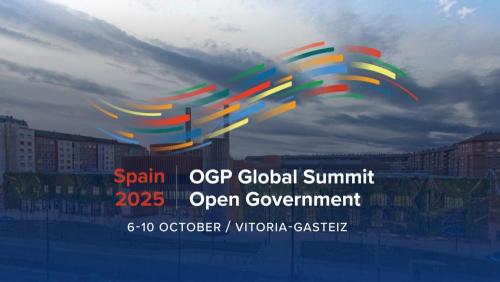
https://spain.ogpsummit.org/p/#/overview
https://spain.ogpsummit.org/p/#/overview
The Open Government Partnership (OGP) helps governments and citizens work together to build more open, resilient, and prosperous societies through empowerment, collaboration, and accountability.
In 2011, government leaders and civil society advocates came together to create a unique partnership—one that combines these powerful forces to promote transparent, participatory, inclusive and accountable governance.
The Open Government Partnership (OGP) includes 74 countries and 150 local governments – representing more than two billion people – and thousands of civil society organizations.
What is the 2025 Open Government Partnership Global (OGP) Summit?
The Government of Spain will host the 2025 OGP Global Summit in Vitoria-Gasteiz, Spain, bringing together 2,000 representatives from governments, civil society, and policy-making institutions worldwide. The Summit will serve as a platform for promoting open government values, as well as exchanging experiences, best practices, and advancements in open government initiatives. This will be the ninth OGP Global Summit. Previous OGP Global Summits have been held in Canada, Georgia, Estonia, France, Korea, Mexico, the United Kingdom, and Brazil.
When and where is the OGP Global Summit taking place?
The 2025 OGP Global Summit will take place from October 6-10, 2025. Related activities and side events will happen throughout the week as well. The Summit venue is the Palacio de Congresos Europa (Av. Gasteiz, 85, Txagorritxu, 01009 Vitoria-Gasteiz, Álava, Spain).
Which policy areas will the event focus on and how will the agenda be designed?
The Summit agenda will align with the Co-Chair Program of the Government of Spain and Cielo Magno:
People: Protecting civic space, strengthening democracy, and ensuring a balance between government, civil society, and private sector contributions.
Institutions: Engaging all branches of government - including parliament and justice - to enhance transparency, accountability, and participation.
Technology & Data: Addressing digital rights, social media governance, and internet freedoms, while promoting online civic space and freedom of expression.
A draft agenda is available on the Summit website. Updates including featured speakers, session details, and side events will be posted in the lead up to the Summit.
How can I organize a side event?
See here for the Guide to Side Events. Partners like governments, national and international civil society organizations, multilateral organizations, and others will hold workshops, consultations, and other events around the Summit. The deadline for submitting side events has passed. Validated side events will be published on the Summit website on a rolling basis.
How can I register for the 2025 OGP Global Summit?
Registration for the 2025 OGP Global Summit has closed. We have received overwhelming interest in the event and cannot accept late registrations except for invited speakers and confirmed delegation members.
Do I need a visa to travel to Spain?
Information regarding visa needs and applications is available here. Generally, citizens whose passports are issued by members of the European Union, the European Economic Area and the Schengen area can travel to Spain visa-free. There are a number of other countries whose citizens can also travel to Spain without a visa, depending on your passport type.
If your country is not listed as eligible for visa-free travel to Spain, then you will be required to apply for a visa.
More information about visas and documents required to apply for a visa, such as a Summit participation letter, will be available and issued after your Summit registration is approved.
In 2011, government leaders and civil society advocates came together to create a unique partnership—one that combines these powerful forces to promote transparent, participatory, inclusive and accountable governance.
The Open Government Partnership (OGP) includes 74 countries and 150 local governments – representing more than two billion people – and thousands of civil society organizations.









